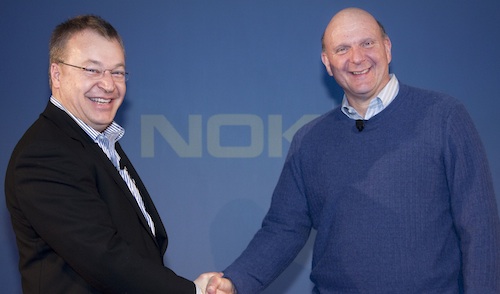
Think about how many of your friends use Nokia handsets today as opposed to a few years ago. Chances are many of them have ditched the Finnish handset manufacturer’s devices for alternatives from companies such as Apple, Samsung, HTC and BlackBerry.
In smartphones, Nokia has fallen dangerously far behind its competitors. Since the introduction of the first Apple iPhone in 2007, Nokia has been casting about for a response and still hasn’t come up with something compelling enough to take on the Californian giant. This is evident in the fact that Nokia’s share price has fallen almost 70% in the past five years, while Apple’s has risen by more than 400%.
Apple has demonstrated that consumers are prepared to pay a premium for the right features and applications.
The question many analysts are asking is whether new Nokia CEO Stephen Elop, a former Microsoft executive, can turn around the company’s fortunes. Some suggest his decision to abandon Symbian for Microsoft’s Windows Phone 7 platform is a big step in the right direction.
But, as Elop pointed out in a now-famous memo to staff earlier this year, Nokia is standing on a “burning platform” and has to make tough choices if it’s going to survive, and perhaps even thrive, in what has become an insanely competitive smartphone market.
It appears as if things are going to get worse before they get better. Nokia’s share price was pummelled this week after it issued a profit warning, lowering targets for handset sales. Nokia’s market value is now lower than Taiwan’s fast-growing HTC and just a twelfth of Apple’s.
Though there’s positive sentiment around its upcoming Windows Phone 7-powered smartphone offerings — expected at the end of the year or early next year — some analysts are asking if it’s a case of too little too late.
Nokia’s competitors have at least six months to solidify their share of the smartphone market and Windows Phone 7 has yet to make big inroads into the dominant positions held by Apple, with its iOS operating system, and Google, with Android.
Is Nokia taking an enormous gamble by aligning itself with Microsoft’s software ecosystem, which is still in its infancy? Perhaps.
But it’s not only at the top end of the market where Nokia is facing a big challenge. In the much bigger market for cheaper “feature phones”, where it’s still strong, especially in emerging markets, it’s facing growing challenges from Chinese manufacturers such as ZTE and Huawei.
However, it’s not all doom and gloom for Nokia, says Steven Ambrose, MD of local consulting firm Strategy Worx. “IBM had to lose a fortune before it could reinvent itself and right the ship,” he says. “Nokia already knows it has to reinvent itself. Yet it’s still profitable, it’s still selling a ton of devices globally, and it still has incredibly deep pockets, so I think it is in a great position to stage a strong comeback.”
Ambrose says the company’s deal with Microsoft is a “great move”. “Windows Phone 7 is proving to be a great operating system and it’s showing it’s equipped to compete with iOS and Android. Microsoft has huge access to all sorts of advantages that other companies don’t: Office, Windows Live as well as millions of users. I don’t think Nokia is at any risk of imminent closure. It can afford a lot of pain and it’s feeling that pain financially now. It’s a great company with great resources and great intellectual property.”
He says Nokia is facing a “wake-up call” and this should be good for consumers because it will drive innovation.
Mark Walker, an analyst at International Data Corp, argues that “traditional logic would have it that the Microsoft deal would boost [Nokia], but it’s two moribund players getting together, which might equal a greater sense of nothing, rather than ensuring joint success”.
“Microsoft hasn’t come up with great innovations in recent years. There have been calls for heads to roll and the share price has been standing still,” he says. “Nokia was dominant 10 years ago, but it’s missed the smartphone boat. It’s been neither innovative nor exciting.”
On a more positive note, Microsoft knows how to bring new technology to market and Nokia hasn’t lost the ability to innovate and still has a loyal customer base, Walker says. “We can’t write off Nokia.”
He says both Nokia and Microsoft are “getting their acts together”. “Both companies have organisational power and brand recognition, but both are running out of time and goodwill. They have to make big moves, and quickly.” — Craig Wilson, TechCentral
- Subscribe to our free daily newsletter
- Follow us on Twitter or on Facebook




